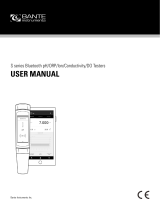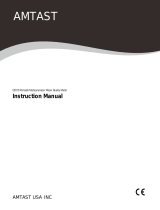Page is loading ...

TDSscan20 Pocket TDS Tester
USER MANUAL
Bante Instruments Inc.

1 I TDSscan20
Overview
Thank you for selecting the TDSscan series pocket TDS tester. This user
manual provides a step-by-step guide to help you operate the tester,
please carefully read the following instructions before use.
Installing the Batteries
1. Twist the electrode collar counter clockwise, pull the electrode
away from the tester.
2. Insert two AAA alkaline batteries into the battery compartment,
note polarity.
3. Push the electrode into the tester and twist the electrode collar
clockwise until tight.
Keypad
Key
Function
• Switch the tester on or off
• Lock or unlock measurement
• Exit the calibration, settings and return to the TDS
measurement
• Start calibration
• Press and hold the key to enter the setup menu
• Select an option
• Confirm the calibration, settings or displayed option
Display
Icon
Description
When the battery voltage falls below the minimum
power requirements, the icon automatically
disappears
MEAS
Indicates that the tester is in the measurement mode
CAL
Indicates that the tester is in the calibration mode
SETUP
Indicates that the tester is in the setup mode
ATC
Indicates that the automatic temperature compensation
is enabled
Prior to Use
Remove the protective cap from the bottom of the tester. If the sensor
has dried out, soak the electrode for about 10 minutes in tap water.
Switching the Tester On and Off
• Press and hold the Meas key for about 5 seconds to switch on
the tester.
• Press and hold the Meas key to switch off the tester.
If you do not press any key within 8 minutes, the tester will switch off
automatically to conserve energy.
Sensor

TDSscan20 I 2
Setup Menu
The TDSscan20 tester contains 7 menu items in the setup menu, the
following table describes the functions of each option.
Menu Item
Option and Description
Calibration Points
Set the number of calibration points.
1 point (default)
2 points
3 points
TDS Factor
Set the default TDS conversion factor.
0.1 to 1.0%/° C (default 0.5)
Measurement Unit
Set the default temperature unit.
Degrees Celsius (default)
Degrees Fahrenheit
Temperature Calibration
Refer to page 3.
Reading ± 10° C
Reading ± 10° F
Auto-Hold
If enabled, the tester will automatically sense and
lock the measurement endpoint.
Enable
Disable (default)
Auto-Power Off
If enabled, the tester will automatically switch off
if no key is pressed within 8 minutes.
Enable (default)
Disable
Factory Reset
If enabled, all of the calibration values and current
settings will be deleted or reset to the factory
defaults, the tester must be recalibrated.
Enable
Disable (default)
Setting the Default Option
1. In the measurement mode, press and hold the Cal key to enter
the setup menu.
2. If necessary, press the Cal key again to select an option.
3. Press the Enter key, the tester saves the current option and moves
to the next menu item.
4. Repeat steps above until the tester returns to the measurement
mode.
• During the setting process, if you do not need to calibrate the
temperature, press the Enter key to skip the / or /
option.
• To exit the setup menu, press the Meas key.
TDS Calibration
The TDSscan20 tester allows 1 to 3 points calibration. We recommend
that you perform 3 points calibration or select a standard solution
closest to the sample TDS you are measuring. When the calibration
is completed, all new calibration values will automatically override
existing data.
Make sure that using the fresh standard solution during the calibration.
DO NOT reuse the standard solution after calibration, contaminants
in solution will affect the calibration and eventually the accuracy of
the measurement.
Option
Menu item

3 I TDSscan20
Single Point Calibration
Ensure that you have selected 1 point calibration in the setup menu.
1.1 Press the Cal key, the tester shows ----/CAL 1.
1.2 Rinse the electrode with distilled water and place into the
standard solution. Stir tester gently to remove air bubbles trapped.
in the slot of the sensor. The tester will automatically recognize.
the standard solution and show the calibration value.
1.3 Press the Enter key, the default calibration value begins flashing.
1.4 If necessary, press the Cal key to modify the calibration value,
press the Enter key to confirm and move to the next digit. When
the setting is completed, make sure that the displayed value
matches the calibration standard.
1.5 Press the Enter key, the tester begins the calibration. When the
reading has stabilized, the display will show . Calibration
is completed.
Multipoint Calibration
Ensure that you have selected 2 or 3 points calibration in the setup
menu.
2.1 Repeat steps 1.1 through 1.5 above. When the first calibration
point is completed, the display will show ----/CAL 2, the tester
prompts you to continue with second point calibration.
2.2 Repeat steps 1.2 through 1.5 above until the display shows .
Calibration is completed.
To exit the calibration without saving calibrated value, press the Meas
key.
Temperature Calibration
The TDSscan20 tester is installed with a built-in temperature sensor
for automatic temperature compensation. During the measurement,
if the measured temperature reading differs from that of an accurate
thermometer, the tester needs to be calibrated.
1. Press and hold the Cal key to enter the setup menu.
2. Press the Enter key until the display shows / or / .
3. Press the Cal key, the tester enters the temperature calibration
mode.
4. Place the electrode into a solution with a known accurate
temperature and wait for the measurement to stabilize.

TDSscan20 I 4
5. Press the Cal key to modify the temperature value.
6. Press the Enter key to save and press the Meas key to return
to the measurement mode.
Measurement
Rinse the electrode with distilled water, place the electrode into the
sample solution and stir gently, make sure that no air bubbles on the
sensor surface. Wait for the measurement to stabilize and record the
reading.
• During the measurement, DO NOT completely immerse the tester
in water.
• If the display shows ---- indicating the measurement exceeds the
range, remove the tester from the sample immediately.
• If the option is enabled in the setup menu, the tester will
automatically lock the measurement endpoint and show HOLD
icon. Press the Meas key to resume measuring.
Electrode
Maintenance and Replacement
• Rinse the electrode thoroughly with distilled water after use.
• Do not touch the platinum black coating on the sensor surface
and always keep it clean.
• If there is a build-up of solids inside the sensor, remove carefully,
then recalibrate the tester.
• If you do not use the tester for long periods, remove the batteries.
Replacing the Electrode
If the tester fails to calibrate or gives fluctuating readings, you should
consider replacing the electrode.
1. Twist the electrode collar counter clockwise, pull the electrode
away from the tester.
2. Align the slot on the new electrode, gently push the electrode
into the tester.
3. Twist the electrode collar clockwise until tight.

Appendix
Calculating the TDS Conversion Factor
The TDSscan20 tester allows setting the conversion factor according
to the type of sample. The factory default is 0.50. The following formula
describes the calculation method.
Factor =
Where:
Actual TDS = Value from the high purity water and precisely weighed
NaCl or KCL reagent
Actual Conductivity = The tester measured conductivity value
For example:
Dissolve 64 grams of the potassium chloride (KCl) reagent in 1 liter
distilled water. If measured conductivity is 100 mS/cm, then TDS factor
is 0.64.
Preparation of TDS Standard Solutions
Place the analytical grade potassium chloride (KCl) in a beaker and dry
in an oven for about 3 hours at 105° C (221° F), then cool to room
temperature. Add the reagent to a 1 liter volumetric flask according
to the instructions in table below.
TDS Standard
Reagent
Weight
71.8 ppm
KCl
74.4 mg
744.7 ppm
KCl
745.5 mg
7447 ppm
KCl
7.45 g
Fill the distilled water to the mark, mix the solution until the reagent
is completely dissolved.
Optional Accessories
Order Code
Description
E-ECscan-C1-10K
2-pole conductivity cell, K=1
TDSCS-718
Standard solution 71.8 ppm, 480 ml
TDSCS-744
Standard solution 744 ppm, 480 ml
TDSCS-7447
Standard solution 7447 ppm, 480 ml
Tester Specifications
Model
TDSscan20
TDS
0 to 10.00, 100.0, 1000 ppm, max. 20.00 ppt
5 I TDSscan20
Range
Resolution
0.01, 0.1, 1
Accuracy
± 1% F.S.
Calibration Points
1 to 3 points
Temperature
Range
0 to 60° C (32 to 140° F)
Resolution
0.1° C (0.1°F)
Accuracy
± 1° C (± 1.8°F)
Calibration Point
1 point
Calibration Range
Reading ± 10° C/° F
Other Specifications
Temperature Compensation
0 to 60° C (32 to 140° F), automatic
TDS Factor
0.1 to 1.0
Operating Temperature
0 to 50° C (32 to 122° F)
Storage Temperature
0 to 60° C (32 to 140° F)
Relative Humidity
< 80% (non-condensing)
IP Rating
IP54
Display
LCD, 21 × 21 mm (0.82 × 0.82 in.)
Power Requirements
2 × 1.5V AAA alkaline batteries
Auto-Off
8 minutes after last key pressed
Dimensions
185 (L) × 40 (Ø ) mm (7.28 × 1.57 in.)
Weight
100 g (3.5 oz.)
Actual TDS
Actual Conductivity @ 25° C

The information in this document is subject to change without notice.
Copyright © Bante Instruments Inc, 2022. All rights reserved.
Disposal
This product is required to comply with the European Union’s Waste
Electrical and Electronic Equipment (WEEE) Directive 2002/96/EC and
may not be disposed of in domestic waste. Please dispose of product
in accordance with local regulations at the collecting point specified
for electrical and electronic equipment.
Warranty
The warranty period for tester is one year from the date of shipment.
Above warranty does not cover the electrode and standard solutions.
Out of warranty products will be repaired on a charged basis.
The warranty on your tester shall not apply to defects resulting from:
• Improper or inadequate maintenance by customer
• Unauthorized modification or misuse
• Operation outside of the environment specifications of the
products.
For more information, please contact the supplier.
Office: 4715 Castlewood St., Sugar land, TX 77479, USA
Tel: (+1) 346-762-7358
E-mail: banteinstruments@yahoo.com
Factory: F3, Building 2, No.2185, Laifang Rd., Shanghai 201615, China
Tel: (+86) 21-6404-1598
E-mail: banteinstrument@hotmail.com
www.bante-china.com
/









